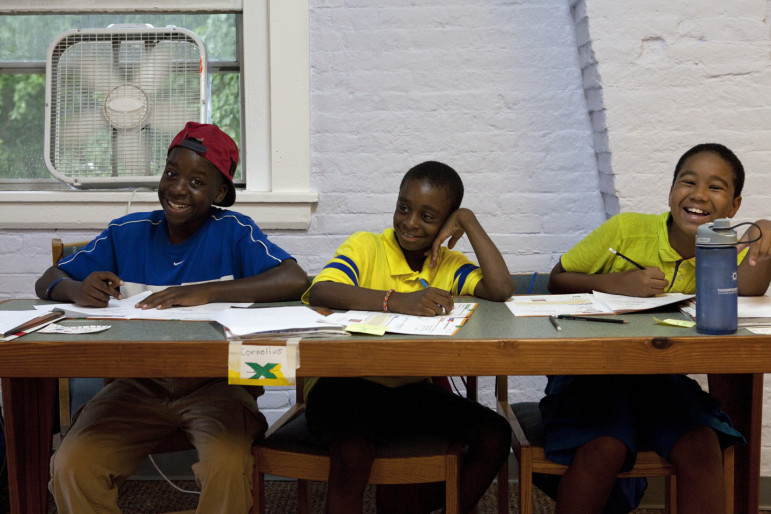
Wallace Foundation
The 574 children in the Boston summer learning program studied in 2013 were offered a variety of enrichment activities. Each site was also expected to offer 120 minutes of reading instruction and 60 minutes of math instruction each day.
Math improved after a voluntary summer learning program, but not reading or social skills, according to a RAND Corporation report released today.
Low-income third-graders in voluntary school-district summer programs bucked the “summer slide” in math and started the new school year with improved math skills.
However, they did not show significant improvement in reading or in social and emotional development.
The report, “Ready for Fall? Near-Term Effects of Voluntary Summer Learning Programs on Low-Income Students’ Learning Opportunities and Outcomes” is part of The Wallace Foundation’s multiyear National Summer Learning Study.
It found that children in five urban school districts gained about one-fifth of the math knowledge they would have acquired during a complete school year.
“We have enough information to conclude that these programs benefit children, and that children who engage in summer learning programs improve academic skills,” said Mike Miles, superintendent of the Dallas Independent School District, in a statement.
Catherine H. Augustine, senior policy researcher at the RAND Corporation and an author of the report, said that improving reading skills remains a challenge.
“I think we were all hoping to see [better] outcomes in reading,” she said.
Reading comprehension is a difficult skill to improve and measure, she said, and the instructional quality may not have been sufficient.
The $50 million National Summer Learning Study is looking at the impact on low-income kids of two consecutive summers of academic instruction and enrichment activities that include art, field trips and other pursuits.
The research is the first to assess the impact on low-income kids of large-scale, voluntary, district-run summer programs. Earlier research examined mandatory school-district programs and smaller community programs.
The aim is to understand how to combat summer learning loss and close the achievement gap between low-income and more affluent students.
In Dallas, the Thriving Minds Summer Camp was a collaboration of the school district and the community nonprofit Big Thought. It was offered for 23 days and served 1,028 students at 10 school locations in Dallas.
Boston Public Schools also partnered with a community organization to offer summer programming. It had 574 students in the study.
Also participating in the study were the school districts of Pittsburgh, Pa.; Rochester, N.Y.; and Duval County, Fla.
Kids in these summer programs were compared with a randomized control group.
Based on the research, the report recommends that programs be five or six weeks long and provide 60 to 90 minutes of math each day.
Although the students on average did not show improvement in reading, the reading gains that existed were correlated with teachers who had experience in teaching the grade level and with sites that had better behavior management policies, as rated by teachers.
Recommendations for summer learning programs include:
- Promote consistent attendance and adherence to the schedule.
- Attract effective teachers with grade-level experience.
- Provide coaching and professional development on instructional quality for teachers.
- Maintain positive student behavior.


























